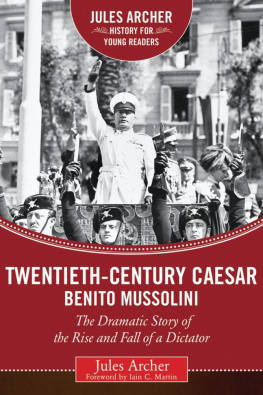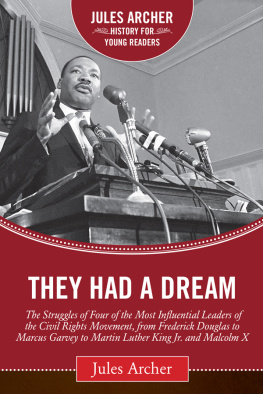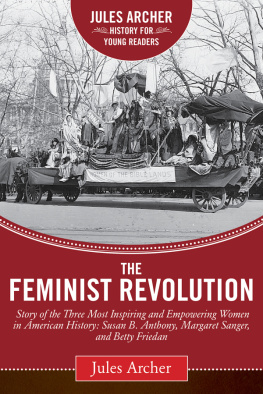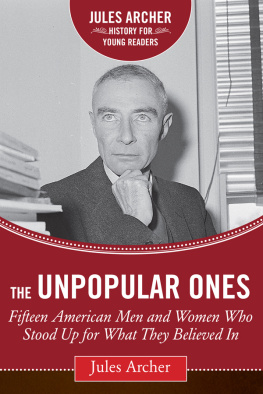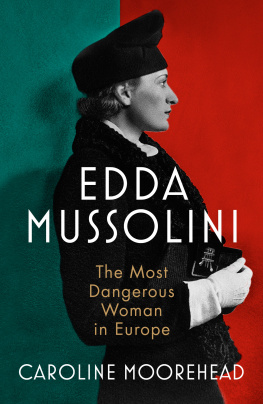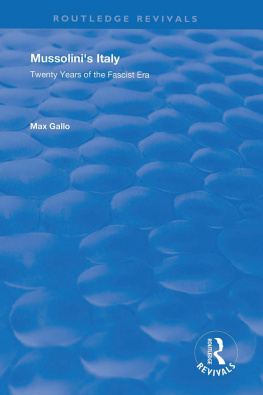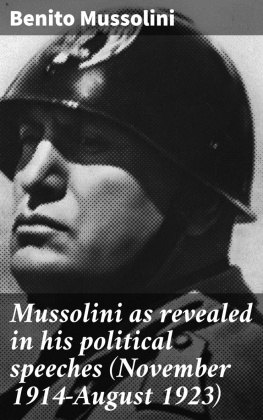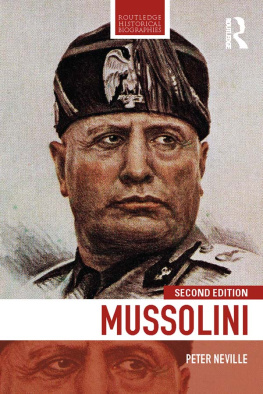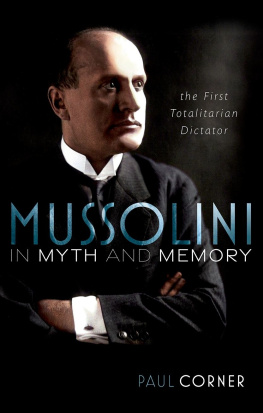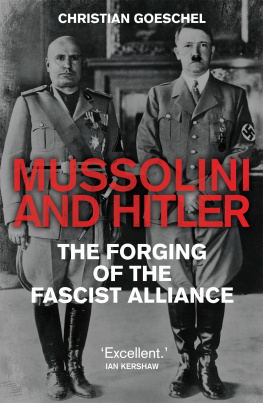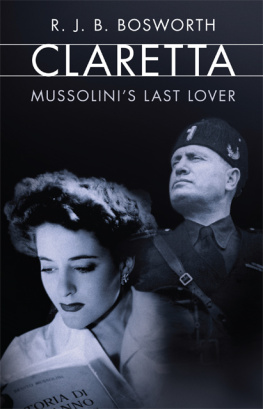TWENTIETH-CENTURY CAESAR: BENITO MUSSOLINI
This biography, first for teenagers gives some understanding of how the man was conditioned in his childhood and youth. The writing is lively and well-focused.
School Library Journal
Mr. Archer has done a very difficult job well.
Kirkus Reviews
[Archers] swift-moving account recaptures in substance the complex historical events that made possible the rise of the preposterous characters who played a major role in shaping them.
New York Times Book Review
For biographical treatment of Mussolini, Jules Archers Twentieth Century Caesar: Benito Mussolini is a better choice.
Library Journal
Historical texts often reflect the time period in which they were written, and new information is constantly being discovered. This book was originally published in 1964, and much has changed since then. While every effort has been made to bring this book up to date, it is important to consult multiple sources when doing research.
Copyright 1964 by Jules Archer
Foreword 2017 by Sky Pony Press, an imprint of Skyhorse Publishing, Inc.
First Sky Pony Press edition, 2017
All rights reserved. No part of this book may be reproduced in any manner without the express written consent of the publisher, except in the case of brief excerpts in critical reviews or articles. All inquiries should be addressed to Sky Pony Press, 307 West 36th Street, 11th Floor, New York, NY 10018.
Sky Pony Press books may be purchased in bulk at special discounts for sales promotion, corporate gifts, fund-raising, or educational purposes. Special editions can also be created to specifications. For details, contact the Special Sales Department, Sky Pony Press, 307 West 36th Street, 11th Floor, New York, NY 10018 or .
Sky Pony is a registered trademark of Skyhorse Publishing, Inc., a Delaware corporation.
Visit our website at www.skyponypress.com.
10 9 8 7 6 5 4 3 2 1
Library of Congress Cataloging-in-Publication Data is available on file.
Series design by Brian Peterson
Cover photo credit Associated Press
Print ISBN: 978-1-63450-199-6
Ebook ISBN: 978-1-5107-0703-0
Printed in the United States of America
To my sons Mike, Dane, and Kerry
Some descriptions of life under Fascism in Italy derive from the authors personal observations during a cycle trip through Europe in 1938. Recollections of the Rome-Berlin Axis days also come from yellowed copies of II Lavoro Fascista, Parissoir and The Manchester Guardian.
The author owes a special debt of gratitude to Mr. George Seldes, distinguished author of Sawdust Caesar , and to Mr. Paolo Monelli, author of Mussolini: The Intimate Life of a Demagogue (through the courtesy of Miss Evelyn Shrifte of Vanguard Press, Inc.), for permission to refer to significant facts about Mussolini I was able to find in no other sources.
Jules Archer
Pine Plains
New York
CONTENTS
Foreword
In ancient Rome, the civil magistrates carried an axe, bundled among wooden rods for strength. It was named fascio littorio and it symbolized the authority of the Roman state, and in practical terms, it could be used to inflict corporal or capital punishment. In the twentieth century, men with visions of power and national greatness would seize upon the concept of a unified people as one country with a new form of government and new form of social order. They named their ideology after this ancient symbol of power, fascismo (i.e., fascism). The first of these modern fascists was a political philosopher, a nationalist visionary and leader of men, Benito Mussolini. By the time his Italian homeland hailed him as Il Duce , the leader in 1927, he had seized all legal power creating a dictatorship.
Mussolinis rise to power began in poverty. He was born on July 29, 1883, in the northern half of Italy, in the small town of Dovia di Predappio, roughly fifteen miles southwest of Ravenna. His father, Alessandro Mussolini, was a blacksmith while his mother, Rosa Mussolini, was a schoolteacher. Although Rosa was a devout Catholic, to the young boy helping his father in the smithy Alessandro preached on various radical ideologies such as socialism, anarchism, and nationalism. Benito was never baptized as a child but as a compromise he was sent to a boarding school run by Catholic monks. There he achieved grades which allowed him to qualify as an elementary teacher in 1901.
Forced to emigrate to Switzerland a year later as a common laborer to avoid military service, Mussolini used this time to educate himself on social and political philosophy. Heavily influenced by his fathers radical beliefs, Benito joined the Italian socialist movement in Switzerland and proceeded to edit party newspapers, give speeches, and organize rallies. In and out of jail for his activities, Mussolini managed to attend a year at the University of Lausanne where he studied social science. Returning to Italy in 1904 to accept amnesty, he joined the Italian Army for a required two years of service before returning to teaching.
By 1909, the call to political activism saw Mussolini move to the Austro-Hungarian city of Trento for a short spell where he worked for the Socialist Party and edited its newspaper. Benito had come to believe in a mix of political thinking. He was greatly influenced by the ideas of Friedrich Nietzsche who opposed religion and promoted elitism, and the writer Georges Sorel who preached that liberal democracy and capitalism should be overthrown by violence, direct action, general strikes, and the cunning use of public speech to awaken the masses.
By 1910, Mussolini was back in his hometown editing a weekly publication. Awarded the editorship of the Socialist Party newspaper Avanti in 1911 for his opposition to the Italian war in Libya, Mussolini became a leading figure in the Socialist movement.
The outbreak of World War I divided the socialist movement between those who sided with intervention and others who wished to remain neutral. Mussolinis desire to intervene in the war to overthrow the Hohenzollern and Habsburg monarchies in Germany and Austria-Hungary, and thereby help free Italian nationals from their rule in places like South Tyrol, drew the ire of his Socialist Party. Expelled for his views, Mussolini transformed his belief that Italian nationalism, not the Socialist class struggle, was the principle object in politics. Calling himself a national socialist he founded a new political movement to promote this, the Fasci Rivoluzionari dAzione Internazionalista , or the fascists for short.
A man of action, Mussolini rejoined his old army corps and spent nine months in the front lines along the Alps. Promoted to corporal for his valor, he was severely wounded when a trench mortar accidentally exploded near his feet almost killing him. He was discharged from the hospital in August 1917 and resumed his editor-in-chief position at his new paper, Il Popolo dItalia. Just how ardent Mussolini was regarding the war can be found in his words in this paper, Three cheers for the war. Three cheers for Italys war and three cheers for war in general. Peace is hence absurd or rather a pause in war.
Riding on a wave of nationalism after the war, fascism grew in popularity with the Italian people. It opposed divisions in social class and called for a unified country with the goal of achieving spazio or vital space in which to expand Italian territory. The ideals of restoring Roman dominance in the Mediterranean were popular, even when those goals were expressed with racist overtones.
Next page
